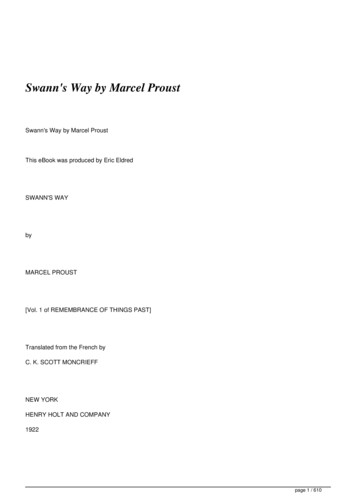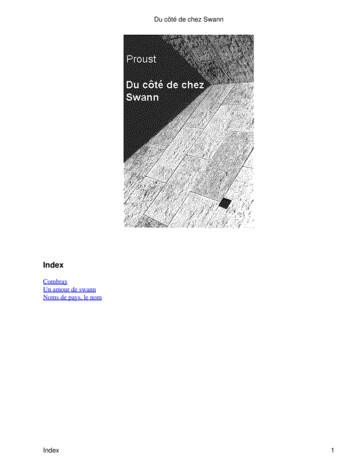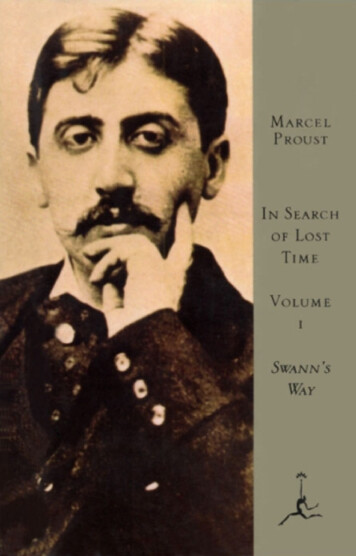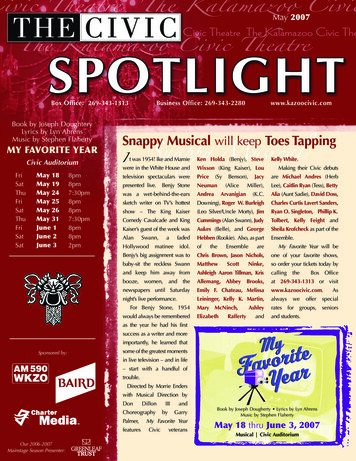
Transcription
Swann's Way by Marcel ProustSwann's Way by Marcel ProustThis eBook was produced by Eric EldredSWANN'S WAYbyMARCEL PROUST[Vol. 1 of REMEMBRANCE OF THINGS PAST]Translated from the French byC. K. SCOTT MONCRIEFFNEW YORKHENRY HOLT AND COMPANY1922page 1 / 610
CONTENTSOVERTURECOMBRAYSWANN IN LOVEPLACE-NAMES: THE NAMEOVERTUREFor a long time I used to go to bed early. Sometimes, when I had put outmy candle, my eyes would close so quickly that I had not even time to say"I'm going to sleep." And half an hour later the thought that it was timeto go to sleep would awaken me; I would try to put away the book which, Iimagined, was still in my hands, and to blow out the light; I had beenthinking all the time, while I was asleep, of what I had just beenreading, but my thoughts had run into a channel of their own, until Imyself seemed actually to have become the subject of my book: a church, awould persist for some moments after I was awake; it did not disturb mymind, but it lay like scales upon my eyes and prevented them fromregistering the fact that the candle was no longer burning. Then it wouldbegin to seem unintelligible, as the thoughts of a former existence mustbe to a reincarnate spirit; the subject of my book would separate itselffrom me, leaving me free to choose whether I would form part of it or no;and at the same time my sight would return and I would be astonished tofind myself in a state of darkness, pleasant and restful enough for thepage 2 / 610
eyes, and even more, perhaps, for my mind, to which it appearedincomprehensible, without a cause, a matter dark indeed.I would ask myself what o'clock it could be; I could hear the whistling oftrains, which, now nearer and now farther off, punctuating the distancelike the note of a bird in a forest, shewed me in perspective the desertedcountryside through which a traveller would be hurrying towards thenearest station: the path that he followed being fixed for ever in hismemory by the general excitement due to being in a strange place, to doingunusual things, to the last words of conversation, to farewells exchangedbeneath an unfamiliar lamp which echoed still in his ears amid the silenceof the night; and to the delightful prospect of being once again at home.I would lay my cheeks gently against the comfortable cheeks of my pillow,as plump and blooming as the cheeks of babyhood. Or I would strike a matchto look at my watch. Nearly midnight. The hour when an invalid, who hasbeen obliged to start on a journey and to sleep in a strange hotel,awakens in a moment of illness and sees with glad relief a streak ofdaylight shewing under his bedroom door. Oh, joy of joys! it is morning.The servants will be about in a minute: he can ring, and some one willcome to look after him. The thought of being made comfortable gives himstrength to endure his pain. He is certain he heard footsteps: they comenearer, and then die away. The ray of light beneath his door isextinguished. It is midnight; some one has turned out the gas; the lastservant has gone to bed, and he must lie all night in agony with no one tobring him any help.page 3 / 610
I would fall asleep, and often I would be awake again for short snatchesonly, just long enough to hear the regular creaking of the wainscot, or toopen my eyes to settle the shifting kaleidoscope of the darkness, tosavour, in an instantaneous flash of perception, the sleep which lay heavyupon the furniture, the room, the whole surroundings of which I formed butan insignificant part and whose unconsciousness I should very soon returnto share. Or, perhaps, while I was asleep I had returned without the leasteffort to an earlier stage in my life, now for ever outgrown; and had comeunder the thrall of one of my childish terrors, such as that old terror ofmy great-uncle's pulling my curls, which was effectually dispelled on theday--the dawn of a new era to me--on which they were finally cropped frommy head. I had forgotten that event during my sleep; I remembered it againimmediately I had succeeded in making myself wake up to escape mygreat-uncle's fingers; still, as a measure of precaution, I would bury thewhole of my head in the pillow before returning to the world of dreams.Sometimes, too, just as Eve was created from a rib of Adam, so a womanwould come into existence while I was sleeping, conceived from some strainin the position of my limbs. Formed by the appetite that I was on thepoint of gratifying, she it was, I imagined, who offered me thatgratification. My body, conscious that its own warmth was permeating hers,would strive to become one with her, and I would awake. The rest ofhumanity seemed very remote in comparison with this woman whose company Ihad left but a moment ago: my cheek was still warm with her kiss, my bodybent beneath the weight of hers. If, as would sometimes happen, she hadthe appearance of some woman whom I had known in waking hours, I wouldpage 4 / 610
abandon myself altogether to the sole quest of her, like people who setout on a journey to see with their own eyes some city that they havealways longed to visit, and imagine that they can taste in reality whathas charmed their fancy. And then, gradually, the memory of her woulddissolve and vanish, until I had forgotten the maiden of my dream.When a man is asleep, he has in a circle round him the chain of the hours,the sequence of the years, the order of the heavenly host. Instinctively,when he awakes, he looks to these, and in an instant reads off his ownposition on the earth's surface and the amount of time that has elapsedduring his slumbers; but this ordered procession is apt to grow confused,and to break its ranks. Suppose that, towards morning, after a night ofinsomnia, sleep descends upon him while he is reading, in quite adifferent position from that in which he normally goes to sleep, he hasonly to lift his arm to arrest the sun and turn it back in its course,and, at the moment of waking, he will have no idea of the time, but willconclude that he has just gone to bed. Or suppose that he gets drowsy insome even more abnormal position; sitting in an armchair, say, afterdinner: then the world will fall topsy-turvy from its orbit, the magicchair will carry him at full speed through time and space, and when heopens his eyes again he will imagine that he went to sleep months earlierand in some far distant country. But for me it was enough if, in my ownbed, my sleep was so heavy as completely to relax my consciousness; forthen I lost all sense of the place in which I had gone to sleep, and whenI awoke at midnight, not knowing where I was, I could not be sure at firstwho I was; I had only the most rudimentary sense of existence, such as maylurk and flicker in the depths of an animal's consciousness; I was morepage 5 / 610
destitute of human qualities than the cave-dweller; but then the memory,not yet of the place in which I was, but of various other places where Ihad lived, and might now very possibly be, would come like a rope let downfrom heaven to draw me up out of the abyss of not-being, from which Icould never have escaped by myself: in a flash I would traverse andsurmount centuries of civilisation, and out of a half-visualisedsuccession of oil-lamps, followed by shirts with turned-down collars,would put together by degrees the component parts of my ego.Perhaps the immobility of the things that surround us is forced upon themby our conviction that they are themselves, and not anything else, and bythe immobility of our conceptions of them. For it always happened thatwhen I awoke like this, and my mind struggled in an unsuccessful attemptto discover where I was, everything would be moving round me through thedarkness: things, places, years. My body, still too heavy with sleep tomove, would make an effort to construe the form which its tiredness tookas an orientation of its various members, so as to induce from that wherethe wall lay and the furniture stood, to piece together and to give a nameto the house in which it must be living. Its memory, the composite memoryof its ribs, knees, and shoulder-blades offered it a whole series of roomsin which it had at one time or another slept; while the unseen walls keptchanging, adapting themselves to the shape of each successive room that itremembered, whirling madly through the darkness. And even before my brain,lingering in consideration of when things had happened and of what theyhad looked like, had collected sufficient impressions to enable it toidentify the room, it, my body, would recall from each room in successionwhat the bed was like, where the doors were, how daylight came in at thepage 6 / 610
windows, whether there was a passage outside, what I had had in my mindwhen I went to sleep, and had found there when I awoke. The stiffened sideunderneath my body would, for instance, in trying to fix its position,imagine itself to be lying, face to the wall, in a big bed with a canopy;and at once I would say to myself, "Why, I must have gone to sleep afterall, and Mamma never came to say good night!" for I was in the countrywith my grandfather, who died years ago; and my body, the side upon whichI was lying, loyally preserving from the past an impression which my mindshould never have forgotten, brought back before my eyes the glimmeringflame of the night-light in its bowl of Bohemian glass, shaped like an urnand hung by chains from the ceiling, and the chimney-piece of Siena marblein my bedroom at Combray, in my great-aunt's house, in those far distantdays which, at the moment of waking, seemed present without being clearlydenned, but would become plainer in a little while when I was properlyawake.Then would come up the memory of a fresh position; the wall slid away inanother direction; I was in my room in Mme. de Saint-Loup's house in thecountry; good heavens, it must be ten o'clock, they will have finisheddinner! I must have overslept myself, in the little nap which I alwaystake when I come in from my walk with Mme. de Saint-Loup, before dressingfor the evening. For many years have now elapsed since the Combray days,when, coming in from the longest and latest walks, I would still be intime to see the reflection of the sunset glowing in the panes of mybedroom window. It is a very different kind of existence at Tansonvillenow with Mme. de Saint-Loup, and a different kind of pleasure that I nowderive from taking walks only in the evenings, from visiting by moonlightpage 7 / 610
the roads on which I used to play, as a child, in the sunshine; while thebedroom, in which I shall presently fall asleep instead of dressing fordinner, from afar off I can see it, as we return from our walk, with itslamp shining through the window, a solitary beacon in the night.These shifting and confused gusts of memory never lasted for more than afew seconds; it often happened that, in my spell of uncertainty as towhere I was, I did not distinguish the successive theories of which thatuncertainty was composed any more than, when we watch a horse running, weisolate the successive positions of its body as they appear upon abioscope. But I had seen first one and then another of the rooms in whichI had slept during my life, and in the end I would revisit them all in thelong course of my waking dream: rooms in winter, where on going to bed Iwould at once bury my head in a nest, built up out of the most diversematerials, the corner of my pillow, the top of my blankets, a piece of ashawl, the edge of my bed, and a copy of an evening paper, all of whichthings I would contrive, with the infinite patience of birds buildingtheir nests, to cement into one whole; rooms where, in a keen frost, Iwould feel the satisfaction of being shut in from the outer world (likethe sea-swallow which builds at the end of a dark tunnel and is kept warmby the surrounding earth), and where, the fire keeping in all night, Iwould sleep wrapped up, as it were, in a great cloak of snug and savouryair, shot with the glow of the logs which would break out again in flame:in a sort of alcove without walls, a cave of warmth dug out of the heartof the room itself, a zone of heat whose boundaries were constantlyshifting and altering in temperature as gusts of air ran across them tostrike freshly upon my face, from the corners of the room, or from partspage 8 / 610
near the window or far from the fireplace which had therefore remainedcold--or rooms in summer, where I would delight to feel myself a part ofthe warm evening, where the moonlight striking upon the half-openedshutters would throw down to the foot of my bed its enchanted ladder;where I would fall asleep, as it might be in the open air, like a titmousewhich the breeze keeps poised in the focus of a sunbeam--or sometimes theLouis XVI room, so cheerful that I could never feel really unhappy, evenon my first night in it: that room where the slender columns which lightlysupported its ceiling would part, ever so gracefully, to indicate wherethe bed was and to keep it separate; sometimes again that little room withthe high ceiling, hollowed in the form of a pyramid out of two separatestoreys, and partly walled with mahogany, in which from the first momentmy mind was drugged by the unfamiliar scent of flowering grasses,convinced of the hostility of the violet curtains and of the insolentindifference of a clock that chattered on at the top of its voice asthough I were not there; while a strange and pitiless mirror with squarefeet, which stood across one corner of the room, cleared for itself a siteI had not looked to find tenanted in the quiet surroundings of my normalfield of vision: that room in which my mind, forcing itself for hours onend to leave its moorings, to elongate itself upwards so as to take on theexact shape of the room, and to reach to the summit of that monstrousfunnel, had passed so many anxious nights while my body lay stretched outin bed, my eyes staring upwards, my ears straining, my nostrils sniffinguneasily, and my heart beating; until custom had changed the colour of thecurtains, made the clock keep quiet, brought an expression of pity to thecruel, slanting face of the glass, disguised or even completely dispelledthe scent of flowering grasses, and distinctly reduced the apparentloftiness of the ceiling. Custom! that skilful but unhurrying manager whopage 9 / 610
begins by torturing the mind for weeks on end with her provisionalarrangements; whom the mind, for all that, is fortunate in discovering,for without the help of custom it would never contrive, by its ownefforts, to make any room seem habitable.Certainly I was now well awake; my body had turned about for the last timeand the good angel of certainty had made all the surrounding objects standstill, had set me down under my bedclothes, in my bedroom, and had fixed,approximately in their right places in the uncertain light, my chest ofdrawers, my writing-table, my fireplace, the window overlooking thestreet, and both the doors. But it was no good my knowing that I was notin any of those houses of which, in the stupid moment of waking, if I hadnot caught sight exactly, I could still believe in their possiblepresence; for memory was now set in motion; as a rule I did not attempt togo to sleep again at once, but used to spend the greater part of the nightrecalling our life in the old days at Combray with my great-aunt, atplaces and people that I had known, what I had actually seen of them, andwhat others had told me.At Combray, as every afternoon ended, long before the time when I shouldhave to go up to bed, and to lie there, unsleeping, far from my mother andgrandmother, my bedroom became the fixed point on which my melancholy andanxious thoughts were centred. Some one had had the happy idea of givingme, to distract me on evenings when I seemed abnormally wretched, a magiclantern, which used to be set on top of my lamp while we waited fordinner-time to come: in the manner of the master-builders andpage 10 / 610
glass-painters of gothic days it substituted for the opaqueness of mywalls an impalpable iridescence, supernatural phenomena of many colours,in which legends were depicted, as on a shifting and transitory window.But my sorrows were only increased, because this change of lightingdestroyed, as nothing else could have done, the customary impression I hadformed of my room, thanks to which the room itself, but for the torture ofhaving to go to bed in it, had become quite endurable. For now I no longerrecognised it, and I became uneasy, as though I were in a room in somehotel or furnished lodging, in a place where I had just arrived, by train,for the first time.Riding at a jerky trot, Golo, his mind filled with an infamous design,issued from the little three-cornered forest which dyed dark-green theslope of a convenient hill, and advanced by leaps and bounds towards thecurved line which was in fact the circumference of one of the transparentovals in the slides which were pushed into position through a slot in thelantern. It was only the wing of a castle, and in front of it stretched agirdle. The castle and the moor were yellow, but I could tell their colourwithout waiting to see them, for before the slides made their appearancethe old-gold sonorous name of Brabant had given me an unmistakable clue.Golo stopped for a moment and listened sadly to the little speech readaloud by my great-aunt, which he seemed perfectly to understand, for hemodified his attitude with a docility not devoid of a degree of majesty,so as to conform to the indications given in the text; then he rode awayat the same jerky trot. And nothing could arrest his slow progress. If thelantern were moved I could still distinguish Golo's horse advancing acrosspage 11 / 610
the window-curtains, swelling out with their curves and diving into theirfolds. The body of Golo himself, being of the same supernatural substanceas his steed's, overcame all material obstacles--everything that seemed tobar his way--by taking each as it might be a skeleton and embodying it inhimself: the door-handle, for instance, over which, adapting itself atonce, would float invincibly his red cloak or his pale face, never losingits nobility or its melancholy, never shewing any sign of trouble at sucha transubstantiation.And, indeed, I found plenty of charm in these bright projections, whichseemed to have come straight out of a Merovingian past, and to shed aroundme the reflections of such ancient history. But I cannot express thediscomfort I felt at such an intrusion of mystery and beauty into a roomwhich I had succeeded in filling with my own personality until I thoughtno more of the room than of myself. The anaesthetic effect of custom beingdestroyed, I would begin to think and to feel very melancholy things. Thedoor-handle of my room, which was different to me from all the otherdoorhandles in the world, inasmuch as it seemed to open of its own accordand without my having to turn it, so unconscious had its manipulationbecome; lo and behold, it was now an astral body for Golo. And as soon asthe dinner-bell rang I would run down to the dining-room, where the bighanging lamp, ignorant of Golo and Bluebeard but well acquainted with myfamily and the dish of stewed beef, shed the same light as on every otherevening; and I would fall into the arms of my mother, whom the misfortunesof Golo had driven me to a more than ordinarily scrupulous examination ofmy own conscience.page 12 / 610
But after dinner, alas, I was soon obliged to leave Mamma, who stayedtalking with the others, in the garden if it was fine, or in the littleparlour where everyone took shelter when it was wet. Everyone except mygrandmother, who held that "It is a pity to shut oneself indoors in thecountry," and used to carry on endless discussions with my father on thevery wettest days, because he would send me up to my room with a bookinstead of letting me stay out of doors. "That is not the way to make himstrong and active," she would say sadly, "especially this little man, whoneeds all the strength and character that he can get." My father wouldshrug his shoulders and study the barometer, for he took an interest inmeteorology, while my mother, keeping very quiet so as not to disturb him,looked at him with tender respect, but not too hard, not wishing topenetrate the mysteries of his superior mind. But my grandmother, in allrushed indoors with the precious wicker armchairs, so that they should notget soaked--you would see my grandmother pacing the deserted garden,lashed by the storm, pushing back her grey hair in disorder so that herbrows might be more free to imbibe the life-giving draughts of wind andrain. She would say, "At last one can breathe!" and would run up and downthe soaking paths--too straight and symmetrical for her liking, owing tothe want of any feeling for nature in the new gardener, whom my father hadbeen asking all morning if the weather were going to improve--with herkeen, jerky little step regulated by the various effects wrought upon hersoul by the intoxication of the storm, the force of hygiene, the stupidityof my education and of symmetry in gardens, rather than by any anxiety(for that was quite unknown to her) to save her plum-coloured skirt fromthe spots of mud under which it would gradually disappear to a depth whichpage 13 / 610
always provided her maid with a fresh problem and filled her with freshdespair.When these walks of my grandmother's took place after dinner there was onething which never failed to bring her back to the house: that was if (atone of those points when the revolutions of her course brought her,moth-like, in sight of the lamp in the little parlour where the liqueurswere set out on the card-table) my great-aunt called out to her:"Bathilde! Come in and stop your husband from drinking brandy!" For,simply to tease her (she had brought so foreign a type of mind into myfather's family that everyone made a joke of it), my great-aunt used tomake my grandfather, who was forbidden liqueurs, take just a few drops. Mypoor grandmother would come in and beg and implore her husband not totaste the brandy; and he would become annoyed and swallow his few dropsall the same, and she would go out again sad and discouraged, but stillsmiling, for she was so humble and so sweet that her gentleness towardsothers, and her continual subordination of herself and of her owntroubles, appeared on her face blended in a smile which, unlike those seenon the majority of human faces, had no trace in it of irony, save forherself, while for all of us kisses seemed to spring from her eyes, whichcould not look upon those she loved without yearning to bestow upon thempassionate caresses. The torments inflicted on her by my great-aunt, thesight of my grandmother's vain entreaties, of her in her weaknessconquered before she began, but still making the futile endeavour to weanmy grandfather from his liqueur-glass--all these were things of the sortto which, in later years, one can grow so well accustomed as to smile atthem, to take the tormentor's side with a. happy determination whichpage 14 / 610
deludes one into the belief that it is not, really, tormenting; but inthose days they filled me with such horror that I longed to strike mygreat-aunt. And yet, as soon as I heard her "Bathilde! Come in and stopyour husband from drinking brandy!" in my cowardice I became at once aman, and did what all we grown men do when face to face with suffering andinjustice; I preferred not to see them; I ran up to the top of the houseto cry by myself in a little room beside the schoolroom and beneath theroof, which smelt of orris-root, and was scented also by a wildcurrant-bush which had climbed up between the stones of the outer wall andthrust a flowering branch in through the half-opened window. Intended fora more special and a baser use, this room, from which, in the daytime, Icould see as far as the keep of Roussainville-le-Pin, was for a long timewas allowed to lock, whenever my occupation was such as required aninviolable solitude; reading or dreaming, secret tears or paroxysms ofdesire. Alas! I little knew that my own lack of will-power, my delicatehealth, and the consequent uncertainty as to my future weighed far moreheavily on my grandmother's mind than any little breach of the rules byher husband, during those endless perambulations, afternoon and evening,in which we used to see passing up and down, obliquely raised towards theheavens, her handsome face with its brown and wrinkled cheeks, which withage had acquired almost the purple hue of tilled fields in autumn,covered, if she were walking abroad, by a half-lifted veil, while uponthem either the cold or some sad reflection invariably left the dryingtraces of an involuntary tear.My sole consolation when I went upstairs for the night was that Mammawould come in and kiss me after I was in bed. But this good night lastedpage 15 / 610
for so short a time: she went down again so soon that the moment in whichI heard her climb the stairs, and then caught the sound of her gardendress of blue muslin, from which hung little tassels of plaited straw,rustling along the double-doored corridor, was for me a moment of thekeenest sorrow. So much did I love that good night that I reached thestage of hoping that it would come as late as possible, so as to prolongthe time of respite during which Mamma would not yet have appeared.Sometimes when, after kissing me, she opened the door to go, I longed tocall her back, to say to her "Kiss me just once again," but I knew thatthen she would at once look displeased, for the concession which she madeto my wretchedness and agitation in coming up to me with this kiss ofpeace always annoyed my father, who thought such ceremonies absurd, andshe would have liked to try to induce me to outgrow the need, the customof having her there at all, which was a very different thing from lettingthe custom grow up of my asking her for an additional kiss when she wasalready crossing the threshold. And to see her look displeased destroyedall the sense of tranquillity she had brought me a moment before, when shebent her loving face down over my bed, and held it out to me like a Host,for an act of Communion in which my lips might drink deeply the sense ofher real presence, and with it the power to sleep. But those evenings onwhich Mamma stayed so short a time in my room were sweet indeed comparedto those on which we had guests to dinner, and therefore she did not comeat all. Our 'guests' were practically limited to M. Swann, who, apart froma few passing strangers, was almost the only person who ever came to thehouse at Combray, sometimes to a neighbourly dinner (but less frequentlysince his unfortunate marriage, as my family did not care to receive hiswife) and sometimes after dinner, uninvited. On those evenings when, as wesat in front of the house beneath the big chestnut-tree and round the ironpage 16 / 610
table, we heard, from the far end of the garden, not the large and noisyrattle which heralded and deafened as he approached with its ferruginous,interminable, frozen sound any member of the household who had put it outof action by coming in 'without ringing,' but the double peal--timid,oval, gilded--of the visitors' bell, everyone would at once exclaim "Avisitor! Who in the world can it be?" but they knew quite well that itcould only be M. Swann. My great-aunt, speaking in a loud voice, to set anexample, in a tone which she endeavoured to make sound natural, would tellthe others not to whisper so; that nothing could be more unpleasant for astranger coming in, who would be led to think that people were sayingthings about him which he was not meant to hear; and then my grandmotherwould be sent out as a scout, always happy to find an excuse for anadditional turn in the garden, which she would utilise to removesurreptitiously, as she passed, the stakes of a rose-tree or two, so as tomake the roses look a little more natural, as a mother might run her handthrough her boy's hair, after the barber had smoothed it down, to make itstick out properly round his head.And there we would all stay, hanging on the words which would fall from mygrandmother's lips when she brought us back her report of the enemy, asthough there had been some uncertainty among a vast number of possibleinvaders, and then, soon after, my grandfather would say: "I can hearSwann's voice." And, indeed, one could tell him only by his voice, for itwas difficult to make out his face with its arched nose and green eyes,under a high forehead fringed with fair, almost red hair, dressed in theBressant style, because in the garden we used as little light as possible,so as not to attract mosquitoes: and I would slip away as though not goingpage 17 / 610
for anything in particular, to tell them to bring out the syrups; for mygrandmother made a great point, thinking it 'nicer/ of their not beingallowed to seem anything out of the ordinary, which we kept for visitorsonly. Although a far younger man, M. Swann was very much attached to mygrandfather, who had been an intimate friend, in his time, of Swann'sfather, an excellent but an eccentric man in whom the least little thingwould, it seemed, often check the flow of his spirits and divert thecurrent of his thoughts. Several times in the course of a year I wouldhear my grandfather tell at table the story, which never varied, of thebehaviour of M. Swann the elder upon the death of his wife, by whosebedside he had watched day and night. My grandfather, who had not seen himfor a long time, hastened to join him at the Swanns' family property onthe outskirts of Combray, and managed to entice him for a moment, weepingprofusely, out of the death-chamber, so that he should not be present whenthe body was laid in its coffin. They took a turn or two in the park,where there was a little sunshine. Suddenly M. Swann seized my grandfatherby the arm and cried, "Oh, my
Swann's Way by Marcel Proust This eBook was produced by Eric Eldred SWANN'S WAY by MARCEL PROUST [Vol. 1 of REMEMBRANCE OF THINGS PAST] Translated from the French by C. K. SCOTT MONCRIEFF NEW YORK HENRY HOLT AND COMPANY 1922 page 1 / 610. CONTENTS OVERTURE COMBRAY SWANN IN LOVE PLACE-NAMES: THE NAME










